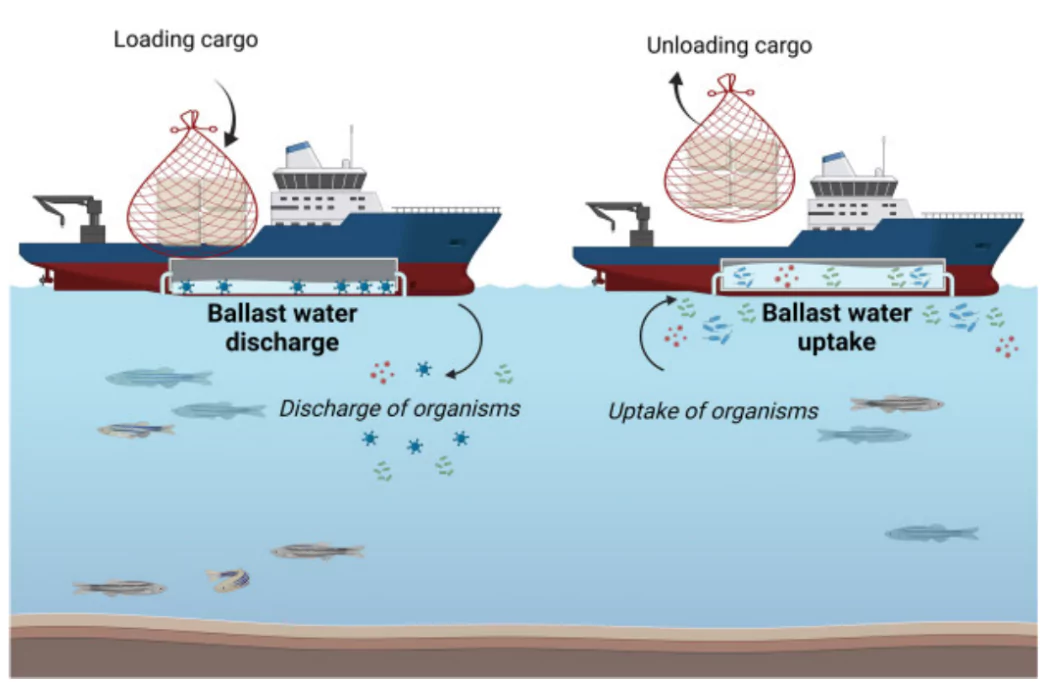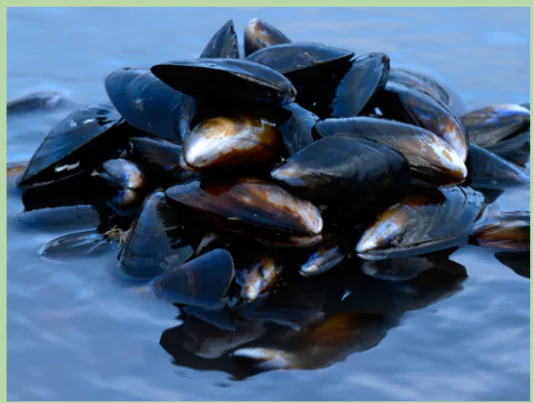The Tamil Nadu Water Resources Department (WRD) has requested ₹160 crore from Kamarajar Port in Ennore, Tamil Nadu to remove invasive mussels from the coast near the port.
Reason for Proliferation: The WRD has accused Kamarajar Port of contributing to the spread of the invasive charru mussel (Mytella strigata) by not properly regulating ballast water discharge from ships.
Invasive Species in India
- Spread in India: Nearly 30 invasive species have been identified in India due to ballast water from ships. One of the most damaging is the charru mussel.
- Charru Mussel’s Impact: The charru mussel has overtaken most other species in Pulicat Lake, Tamil Nadu, and Ashtamudi Lake, Kerala.
- The species has a high survival rate and produces many eggs, allowing it to thrive even in freshwater environments.
- Invasive Species Problem
- Effect on Fishermen: The growth of these mussels is blocking fishing boats, which is hurting the livelihoods of fishermen.
Enroll now for UPSC Online Course
About Ballast Water
- Ballast water is water that ships use to stay balanced and steady while travelling.
- Ships take in this water when they don’t have enough cargo or need extra stability in rough seas.
- It also helps the ship sink lower in the water to pass under bridges or other obstacles.

Process of Ballast Water Management
- Taking on Ballast Water: When a ship delivers cargo to a port and departs with less or no cargo, ballast water is pumped into the tanks for stability.
- Transport and Release: This water is then transported to the ship’s next port-of-call, where it is released as the ship takes on more cargo.
How Does the Ballast Water Treatment System Work?

|
Challenges of Ballast Water
- Invasive Species Spread: Ballast water can transport non-native species to new areas. Once released, these species can invade and disrupt local ecosystems, outcompeting native species.
- Environmental Harm: The introduction of invasive species through ballast water can damage marine habitats, reduce biodiversity, and disrupt the natural food chain.
- Economic Consequences: Invasive species can harm local fisheries, tourism, and other industries that depend on healthy marine environments, leading to financial losses.
- Health Risks: Ballast water can also carry harmful bacteria and pathogens, potentially spreading diseases and posing health risks to new regions.
- Regulatory Challenges: Shipping companies face difficulties in meeting international regulations like the Ballast Water Management (BWM) Convention, which require expensive equipment and strict procedures.
- Technical Difficulties: Installing and maintaining effective ballast water treatment systems on ships is often complex and costly, especially for older vessels that may need upgrades.
Check Out UPSC NCERT Textbooks From PW Store
India’s Position on Ballast Water Regulations
- Current Status: 97 countries have adopted the Ballast Water Management (BWM) Convention, but India is not among them.
- Lack of Obligation: Since India has not signed the BWM Convention, ships entering Indian ports are not required to follow its regulations regarding ballast water.
- Existing Regulations: While there are regulations for other issues, such as oil discharge, there are no specific checks or regulations for ballast water discharged in Indian ports.
- Legal Perspective: Indian ports are not liable for ballast water issues, as they only facilitate ship traffic.
Global Regulations
- BWM Convention: The 2017 IMO Convention requires ships to treat ballast water to prevent the spread of harmful organisms before discharging it.
- Implementation: New ships have systems to chemically treat ballast water, while older ships must exchange ballast water in the ocean.
- Australia and New Zealand: These countries enforce strict ballast water regulations to protect sensitive marine areas like the Great Barrier Reef.
|
Way Forward
- Sign the BWM Convention: India should formally adopt the Ballast Water Management (BWM) Convention.
- This will obligate ships to follow international standards for managing ballast water, helping prevent the introduction of invasive species.
- Implement National Regulations: Develop and enforce national regulations for ballast water management at Indian ports.
- This will ensure that all ships, regardless of their origin, comply with rules to manage and treat ballast water before discharge.
- Upgrade Port Infrastructure: Invest in facilities and technology for monitoring and treating ballast water at Indian ports.
- Enhanced infrastructure will support effective implementation and enforcement of ballast water regulations.
Enroll now for UPSC Online Classes
Mussels

- Mussels are shellfish with two halves of a shell.
- They belong to the marine family Mytilidae or the freshwater family Unionidae.
- Body Structure: They are soft-bodied invertebrates with a calcium carbonate shell.
- Habitat: Commonly found in cool seas worldwide.
Charru mussel
- Scientific name: Mytella strigata
- Native Region: Originally from the coasts of South and Central America.
- Color: Their color can range from black to brown, purple, or dark green.
- Environmental Tolerance: They can live in various salinities and temperatures but cannot survive temperatures above 36°C.
Invasive Species : Invasive species are organisms that are not native to a particular area and cause harm. |
![]() 14 Aug 2024
14 Aug 2024

